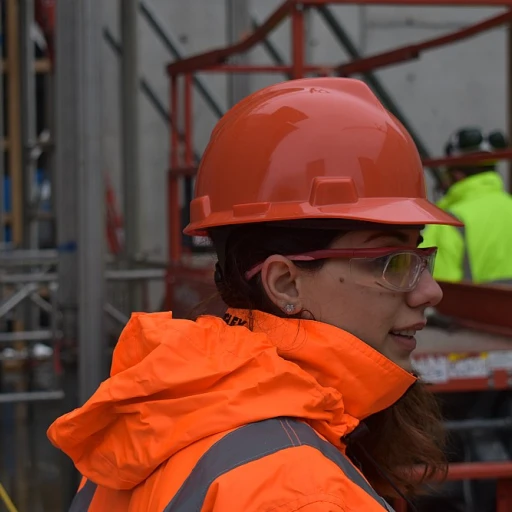The Shift in Work Skills: What Companies Need
The Evolution of Workplace Dynamics
In today's rapidly changing job market, navigating the maze of required skill sets can be challenging. As technological advancements and global connectivity redefine traditional roles, companies are re-evaluating the competencies they deem essential. This shift underscores the importance of understanding what skills will be pivotal in tomorrow's workplace and adapting to these evolving demands.
Organizations are increasingly looking beyond conventional qualifications and emphasizing a versatile skill set that aligns with the demands of the digital age. With automation and AI taking over routine tasks, companies are focusing on skills that machines cannot replicate—like creative problem-solving, emotional intelligence, and the capacity for innovation.
In connection to this redefined skill landscape, critical thinking and problem-solving have become indispensable. As underscored in subsequent discussions, these capabilities ensure that employees are equipped to address complex issues in innovative ways.
Furthermore, leadership and social influence are being revisited in light of technological transformations. The ability to guide teams and influence outcomes in a digitally driven world is more crucial than ever, highlighting the need for dynamic leadership skills.
With the advent of skills-based hiring, organizations now prioritize tangible abilities over traditional degrees, adopting an approach that aligns talent acquisition with actual workplace needs.
As this global shift continues to unfold,
preparing for tomorrow's workplace landscape becomes more vital for both organizations and individuals aiming to stay competitive in the market.
Critical Thinking and Problem Solving: The Future's Must-Have Skills
Embracing Analytical and Creative Thinking
In an ever-evolving job market, companies are increasingly valuing employees who can navigate complex challenges with ease. Critical thinking and problem-solving are not just buzzwords; they are essential skills that empower individuals to tackle unexpected obstacles and devise innovative solutions. As automation and artificial intelligence continue to transform industries, the ability to think critically and solve problems creatively becomes even more crucial.
Critical thinking involves analyzing situations from multiple perspectives, questioning assumptions, and making informed decisions. It's about being able to sift through information, identify key issues, and develop strategic approaches. In tandem with this, problem-solving requires a mindset that is both analytical and creative, allowing individuals to approach challenges with fresh ideas and practical solutions.
These skills are not just for those in leadership roles. Every team member, regardless of their position, benefits from honing their critical thinking and problem-solving abilities. This is particularly important in a tech-driven world where rapid changes demand quick adaptation and innovative thinking, as explored in the section on leadership and social influence.
Moreover, fostering a culture of lifelong learning and curiosity, as discussed in another part of this article, supports the continuous development of these skills. Encouraging employees to engage in ongoing education and skill-building initiatives ensures they remain agile and prepared for future challenges.
In summary, critical thinking and problem-solving are indispensable skills for anyone aiming to thrive in tomorrow's workplace. As we prepare for a future that demands adaptability and innovation, these skills will undoubtedly be at the forefront of what companies seek in their workforce.
Leadership and Social Influence in a Tech-Driven World
Guiding Teams in a Technological Era
In our rapidly evolving world, leadership and social influence are crucial components in navigating the complexities of a tech-driven workplace. As organizations increasingly rely on advanced technologies, the role of a leader has transformed. No longer is it sufficient to simply manage; leaders now need to inspire and motivate their teams to embrace change and innovation.
Effective leaders in today's landscape must possess a deep understanding of how technology impacts business processes and the workforce dynamic. This requires a unique blend of technical insight and empathetic communication skills. Leaders adept in social influence can foster a collaborative environment where diverse ideas are valued, which is essential for driving creative problem-solving and innovation.
Moreover, leaders must leverage social influence to build a culture that champions adaptability and continuous learning. As we've discussed, lifelong learning and curiosity are paramount for maintaining relevance in this rapidly changing environment. By promoting a learning mindset, leaders empower their teams to pursue new knowledge and skills, ensuring they remain competitive and resilient.
This transition also demands that leaders be sensitive to the human aspect of digital transformation. As technology modifies roles and processes, leaders must address concerns and provide support to their teams, ensuring a smooth transition that values both productivity and employee well-being. The ability to influence, guide, and support through social dynamics is becoming an indispensable asset in the future workplace.
Lifelong Learning and Curiosity: Staying Ahead in the Game
Embrace Curiosity and Lifelong Learning
In a rapidly evolving job market, one thing is clear: adaptability is crucial. The workplace of tomorrow demands individuals who aren't just proficient in their current roles but who are also eager to embrace new challenges and develop new skills. Curiosity and lifelong learning are the bedrock of this adaptability, enabling employees to not only survive but thrive in the face of constant change.
Organizations today are looking for talent that is not stagnant but constantly evolving. As technology advances and industries transform, the relevance of continuous education becomes undeniable. Employees need to proactively update their skills to keep pace with new tools, methodologies, and industry trends. This growth mindset is what will set successful professionals apart in the future of work.
Curiosity is the driving force that fuels learning. It prompts individuals to ask questions, seek out new information, and ultimately, acquire new skills. This is not just beneficial for personal and professional development but also serves the organization's interests by fostering innovation and problem-solving. In an era where critical thinking and problem solving are already considered must-have skills, those with a keen sense of curiosity will naturally excel.
Moreover, lifelong learning doesn't merely refer to formal education or attending traditional training sessions. It includes a wide array of learning experiences, from online courses and workshops to self-directed reading and on-the-job training. Forward-thinking companies recognize this and often provide resources and support to cultivate a culture of learning within their teams. This support is essential in preparing for a tech-driven world where leaders need to influence and drive social change effectively.
In conclusion, employees must prioritize continuous learning and nurture their curiosity to stay ahead in the ever-changing work landscape. By doing so, they not only enhance their own career prospects but contribute positively to their organizations' success as they navigate the complexities of a global marketplace.
Skills-Based Hiring: A New Approach for Talent Acquisition
In this rapidly evolving job market, a shift is underway that is redefining how organizations identify, recruit, and develop talent. Skills-based hiring is becoming a significant trend, emphasizing the specific abilities and expertise individuals bring to the table over traditional qualifications such as degrees or past job titles.
Emphasizing Abilities Over Credentials
The demand for certain skills is higher than ever, especially as companies face challenges that require a more nimble workforce capable of adapting to new tools and technologies. This transition towards skills-focused recruitment allows businesses to tap into a diverse pool of candidates who may have unconventional backgrounds but possess the right capabilities to thrive in the evolving landscape.
Crafting Job Descriptions with Precision
As part of this new approach, crafting job postings that clearly articulate the required skills rather than generic qualifications has become imperative. Employers are learning to identify core competencies and align them with the strategic goals of their organizations. This often involves a deep analysis of what truly makes a candidate successful in a given role, focusing less on past experience and more on what a candidate can accomplish.
Utilizing Technology for Talent Acquisition
Technology plays a crucial role in supporting this shift. Innovative recruitment platforms and AI-driven tools are helping HR teams assess candidates in ways that highlight their skill sets through realistic job previews, simulations, and assessments. This not only enhances the matching process but also fosters a more inclusive hiring environment by reducing biases tied to educational and employment backgrounds.
As you consider the broader implications of skills-based hiring and talent acquisition, keep in mind the importance of fostering an environment that continuously nurtures talent. Encouraging continuous growth and learning within the organization ensures that employees not only remain current in their skills but are also prepared for future challenges. This progressive view of employment aligns with the broader themes discussed in this series, particularly the emphasis on lifelong learning and maintaining agility in the ever-changing world of work.
Preparing for the Future Workplace: A Global Perspective
Gearing Up for Global Workforce Changes
As organizations around the world continue to adapt to the rapidly shifting landscape of work, the ability to foresee and prepare for changes is becoming more crucial than ever. It's no longer enough to possess skills relevant only to a localized context; the future workplace demands adaptability to global trends and challenges.
One key aspect to consider is the cultural diversity that comes with a more interconnected world. As businesses operate on a global stage, understanding diverse cultural norms and communication styles can be pivotal. This plays into the need for enhanced leadership and social influence skills, where one can lead teams that transcend geographical and cultural boundaries. Embracing a global perspective isn't just an asset but a requirement.
Furthermore, companies are increasingly looking at skills-based hiring practices, where they prioritize the specific abilities a candidate brings to the table over traditional qualifications. This approach not only expands the talent pool but also ensures that employees can directly contribute to businesses' global objectives. Critical thinking and problem-solving capabilities come into play here, as these competencies enable individuals to tackle unique challenges presented by the varied international markets.
Preparing for this future means fostering a culture of lifelong learning and curiosity. With rapid technological advancements influencing every industry sector, staying informed and adapting to new tools and methodologies can give professionals a competitive edge. The workforce of tomorrow needs to be highly agile and equipped to learn continuously.
Navigating the complexities of the future workplace requires a strategic blend of skills and an openness to remain adaptable in response to global shifts. By acknowledging these changes and preparing accordingly, both individuals and companies can secure their place in the ever-evolving work environment.










